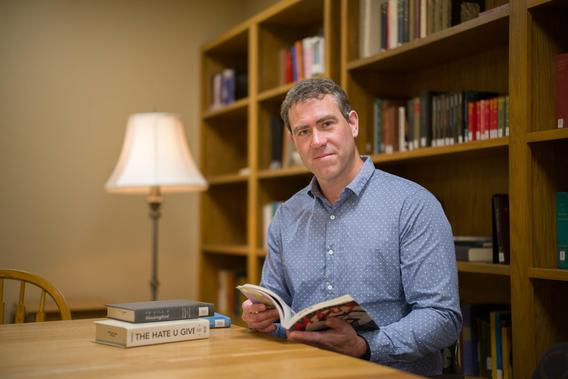Burke Scarbrough loves controversy. Loves to teach it, that is.
As an associate professor in the College of Arts, Humanities and Social Sciences (CAHSS) at the University of Minnesota Duluth (UMD), Scarbrough teaches a longstanding class in which students are assigned to read a banned or challenged book. The group researches the issue and then holds a mock town hall, role-playing various perspectives on it. “We take a two hour class meeting to simulate respectful, but passionate, discussion about the role of these books in our children's classrooms.”

It’s a realistic exercise, one that often plays out in communities across the country, and Scarbrough sees it as a valuable learning opportunity for future teachers and their own students. “There’s an impulse to protect students from real controversy,” says Scarbrough, “but a lot of the best learning happens when students encounter authentic dilemmas.” He hopes that by engaging these challenging topics through respectful discourse in a safe place, his students can learn how to approach them productively in their own classrooms.
Outside of his courses for future English teachers, Scarbrough works to expand and refine the possibilities for the practice of teaching through his research. Much of that work consists of classroom-based case studies of fellow teachers’ methods, and more recently those fellow teachers include his own former students. When two alumni separately contacted him in 2017 with an interest in implementing his mock town hall project in their high school classrooms, Scarbrough was able to turn the opportunity into a collaborative research project. “By the end of it, we had three well-documented examples of how the project went in three very different spaces,” he said. In several conference presentations and a journal article, Scarbrough’s research team shared the project far beyond their three schools—and have watched it become ever more topical.
Again and again, Scarbrough has found that the level of classroom discourse that comes from exploring real challenges and real debate provides an incredible opportunity for learning. “I’m always on the lookout for projects that might open up opportunities for texts, topics, and deliberation that we don't always see in schools.”
By leveraging the challenges that come from controversial texts, he’s found a crucible experience, and one that is perhaps important to share earlier in life, rather than later. Despite the common impulse to protect kids from controversy, Scarbrough’s found that most students are eager to join in the discussion.
“When books become controversial, we've arrived at really interesting questions about ourselves and our schools,” he says, “By and large, young people can handle those questions.”

Scarbrough serves as English Program Coordinator, Teaching Communication Arts and Literature Program Contact, Associate Professor of English Education, and Distinguished University Teaching Professor at UMD. Scarbrough joined the UMD English faculty in 2012. In addition to coordinating the English program, he serves as advisor, methods instructor, and program contact for the Teaching Communication Arts & Literature program. He has taught undergraduate, masters, and doctoral courses in the fields of English education, literature, writing, adolescent development, and social science research methods.
